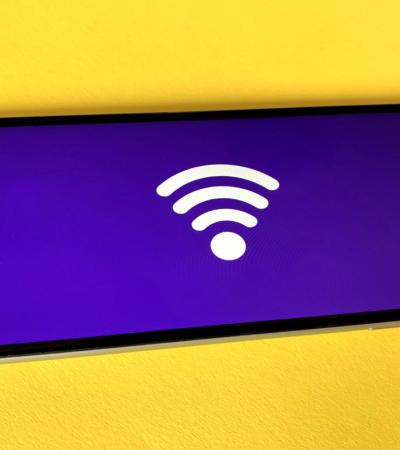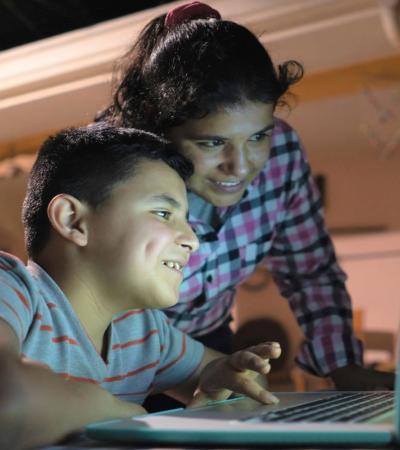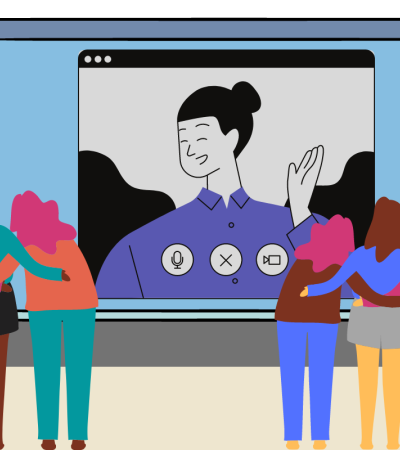In 2020, ALA and Capital One launched the Community Connect: Digital Access at Home pilot to elevate the stark need for additional investment in broadband for rural areas.
20 public libraries received five Wi-Fi hotspots (including service contract) for lending to patrons and a $2,000 stipend to support implementing financial capability programs. Two libraries share how the grant benefitted their communities.
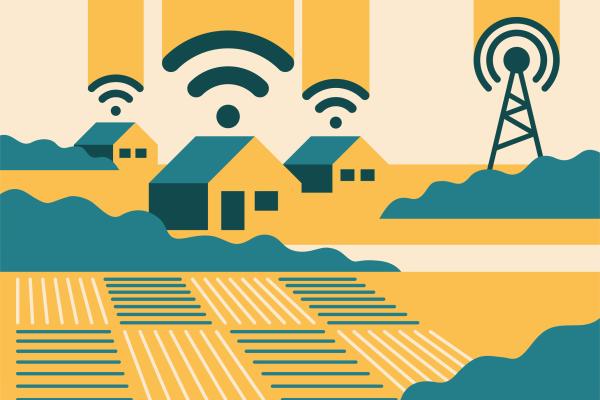
Ada (Okl.) Public Library
Ada, Oklahoma, is one of the largest towns in the state and a central point for retail, trade and medical services. Unfortunately, the mountainous terrain of the region creates a challenge for installing and maintaining internet infrastructure. The cost of the internet can also create another barrier to access, especially for individuals who have low-income socioeconomic status. For many residents, Ada Public Library is the only avenue for affordable and reliable internet access.
Beginning in 2020, Ada Public Library partnered with the American Library Association (ALA) and the Oklahoma Department of Libraries to increase internet access through hotspot lending. Their combined efforts brought an initial 13 hotspots to the Ada community, five of which were funded by ALA’s Community Connect initiative. By the end of the initiative’s first phase, the five hotspots had been circulated 118 times, and they have been in constant circulation since then. To ensure that all patrons have an equal opportunity to borrow a hotspot, the library limits the lending period to two weeks and keeps a waitlist. Approximately 95% of patrons who have borrowed a hotspot request to be added to the reserve list upon returning the device.
According to the director of Ada Public Library, the Community Connect initiative resulted in a number of outcomes, some of which were unexpected. Firstly, some patrons who had not visited the library in years did so to borrow hotspots. The re-established connection gave library staff the opportunity to inform patrons about other community resources, such as financial assistance programs. Additionally, Ada Public Library was able to help other community organizations and partners with the hotspots. For example, prior to the COVID-19 pandemic, McCall Chapel School, a residential facility that provides special education to adults, would visit the library for Story Club once a week. However, for a year during the pandemic, residents were not allowed to leave campus. One of Ada Public Library’s hotspots was designated for McCall Chapel’s use, which allowed the library to provide residents with virtual programming.
At the start of the Community Connect initiative, library staff hoped that technology and internet access would advance enough within the two-year great period that hotspots would no longer be needed.
“When going into this project, it was with the idea that internet access would improve and we could phase [the hotspots] out after a couple of years but unfortunately, internet options do not seem to be progressing as quickly as hoped. Overall, this has been an exceptionally beneficial program for our patrons that has been [very] low monetarily and labor-wise for [us] to implement and maintain.”-Library Staff, Ada Public Library
While Ada Public Library and its patrons wait for more accessible internet options, the Ada community must continue to rely on hotspot lending programs, which are made possible by grants from organizations such as the American Library Association, Capital One, and the Oklahoma Department of Libraries. Ada Public Library plans to sustain its hotspot lending program with help from public funding and has recently been selected to participate in the second phase of ALA’s Community Connect initiative. The next phase of the initiative, Community Connect: Fostering Digital Access, focuses on providing rural public libraries with the resources needed to support patrons in establishing and sustaining affordable high-speed internet connection at home.
Dublin (Texas) County Library
Dublin County Library serves a small population of approximately 5,000, with a sizeable community of dairy and agricultural workers. Unfortunately, residents have had to contend with rising unemployment in the agriculture and manufacturing fields. The consequent financial instability makes it difficult to afford necessities, such as internet access. With help from the Community Connect initiative, Dublin County Library was able to provide patrons with access to the internet through its hotspot lending program.
Although Dublin County Library serves about 5,000 patrons, only 3,600 of these individuals live in Dublin, Texas, where the library is located, approximately two hours from Dallas. For many living in this rural part of Texas, there is only one library within a reasonable distance from their homes. In December 2020, Dublin County Library became a Community Connect grantee and began circulating five hotspots to its patrons. By November 2021 the devices had been circulated 72 times and renewed 47 times. According to the library’s director, the program had a slow start and overall circulation numbers were low during the grant period because of the COVID-19 pandemic. Thus, hotspot circulation might have been larger under normal circumstances.
Additionally, approximately 90% of patrons who borrowed the hotspots checked them out again. Dublin County Library patrons are allowed to keep the hotspots for a month.
According to Dublin County Library’s director, the impact of the Community Connect initiative is “immeasurable.” Library staff saw numerous impacts as patrons shared their personal stories. For example, staff encountered a single mother who could not send her immunocompromised child to school when it reopened after closure due to the COVID-19 pandemic. The hotspot from Dublin County Library gave her an avenue to keep her child safe while attending school virtually. Other patrons reported that they were able to stay connected with family and maintain their businesses.
“This program has been incredibly well received by our community… We have had patrons use [the hotspots] for work, homeschool, and college classes… We wouldn't have been able to introduce hotspots to our community without this grant as we have been struggling with budget cuts. We have been so grateful to be a part of this program and this program has now given us the confidence to pursue the new federal funding for more hotspots.”- Library Staff, Dublin County Library.
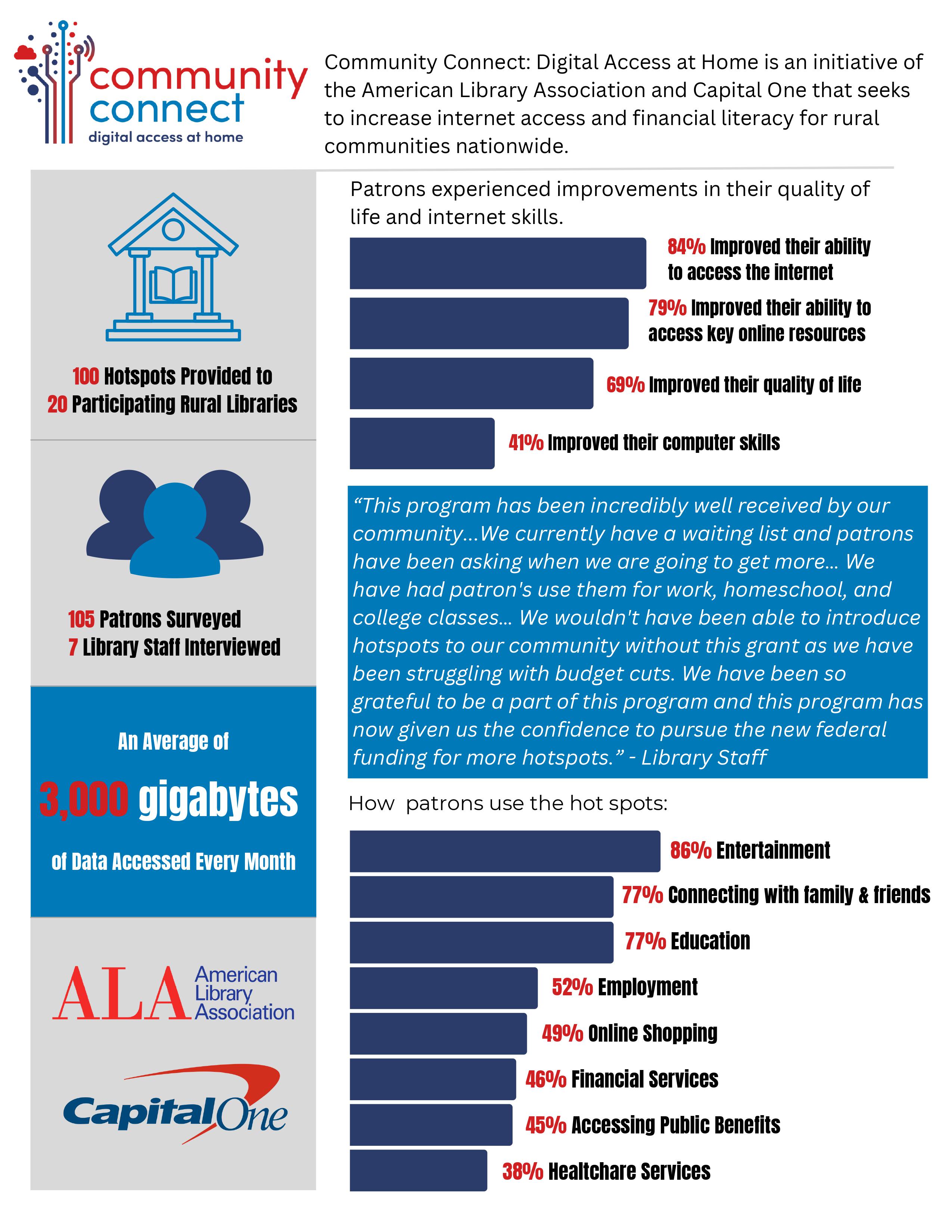
Learn more about Community Connect, an initiative of the American Library Association (ALA) and Capital One Bank, which offers grants and resources to help support digital access and financial capability in rural communities nationwide.

